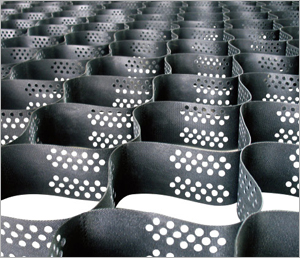- Understanding the Role of Geomembrane Liners in Waste Management
- Innovations in Geomembrane Liners for Water Management
- Geomembrane Liners: A Comprehensive Guide
- The Future of Geomembrane Liners in Civil Engineering
- Geomembrane Liners: Enhancing Landfill Stability
Manager:
WhatsApp:+86 177 0135 2670
Tel:+86 177 0135 2670
Email:marketing@okorder.com
Address:3rd Floor, No.2 Building, No.1 Sanlihe Road
Geomembrane Liners: A Solution for the Containment of Industrial Chemical Runoff
Geomembranes, also known as synthetic liners, are versatile materials that have found their way into various industries due to their ability to contain and control the flow of liquids, especially hazardous chemicals. These liners are typically made from high-density polyethylene (HDPE), polyvinyl chloride (PVC), or ethylene propylene diene monomer (EPDM) rubber, and are designed to provide a barrier against the seepage of contaminants into the surrounding environment. In this article, we will explore the benefits and applications of geomembranes in industrial settings, as well as the factors to consider when choosing the right type of liner for your specific needs.

The Importance of Containment
Industrial facilities often generate chemical runoff as a byproduct of their operations. This runoff can be highly toxic and, if not properly contained, can seep into the ground, contaminate water sources, and harm ecosystems. The primary purpose of a geomembrane liner is to prevent this from happening by creating a physical barrier between the hazardous materials and the environment. This is crucial not only for environmental protection but also for compliance with regulatory standards and avoiding costly penalties.
Versatility in Applications
Geomembranes are not just a one-trick pony; they are used in a wide range of applications across different industries. Some common uses include:
- Waste Management: Lining landfills and containment ponds to prevent leakage of hazardous waste.
- Water and Wastewater Treatment: Creating barriers in treatment ponds and reservoirs to protect against chemical seepage.
- Mining: Containing acidic and metalliferous drainage from mine sites.
- Agriculture: Lining irrigation canals and reservoirs to prevent soil and water contamination.
- Construction: Use in canal lining and tunnel construction to prevent water infiltration.
Factors to Consider When Choosing a Geomembrane
Selecting the right geomembrane for your project involves considering several factors to ensure it meets the specific requirements of your application. These factors include:
- Chemical Resistance: The liner must be resistant to the chemicals it will be exposed to.
- Physical Properties: Consider the strength, durability, and flexibility of the material.
- Temperature Range: Ensure the liner can withstand the temperature extremes of your environment.
- Cost: Evaluate the cost-effectiveness of different materials and installation methods.
- Regulatory Compliance: Make sure the chosen liner meets all relevant environmental and safety regulations.
Installation and Maintenance
Proper installation is key to the effectiveness of a geomembrane liner. It involves:
- Site Preparation: Ensuring the ground is level and free of debris that could puncture the liner.
- Seaming: Joining the panels of the geomembrane together using heat welding, extrusion welding, or adhesives.
- Inspection: Regularly checking the liner for signs of wear, damage, or leaks.
- Maintenance: Performing repairs as needed and replacing the liner when it reaches the end of its service life.
The Future of Geomembranes
As industries continue to evolve and environmental regulations become more stringent, the demand for effective containment solutions like geomembranes is likely to grow. Innovations in material science may lead to the development of new types of liners with improved properties, such as greater resistance to chemicals, longer lifespans, or the ability to degrade more safely at the end of their use.
Personal Touch: Why I Care About Geomembranes
On a personal note, I've always been passionate about environmental conservation. The thought of our beautiful planet being slowly poisoned by industrial waste is heartbreaking. That's why I find the role of geomembranes in protecting our environment incredibly important. They are a testament to human ingenuity in finding solutions to the problems we create.
In conclusion, geomembranes are a vital solution for the containment of industrial chemical runoff. They offer a reliable barrier against environmental contamination, ensuring that our air, water, and soil remain clean and safe for future generations. By understanding the factors involved in choosing the right geomembrane and committing to proper installation and maintenance, we can harness their full potential in preserving our environment.
- Previous:The Use of Geomembrane Liners in the Construction of Industrial Chemical Lagoons
- Next:The Role of Geomembrane Liners in the Construction of Industrial Chemical Reservoirs
-
2024-12-05Geomembrane Liners: A Comprehensive Guide






